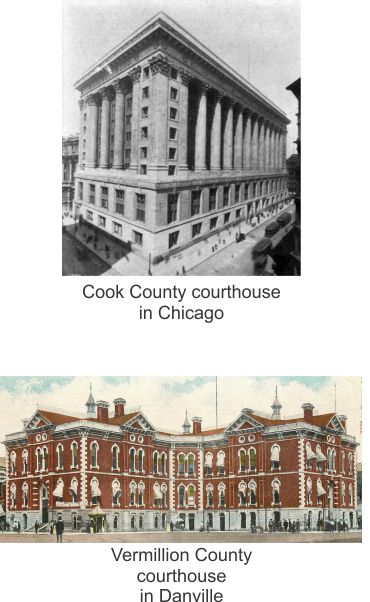|
Legal efforts to assign responsibility for the Iroquois Theater fire disaster.
Summary of attorneys who participated.
( IN PROGRESS )

OFFICIAL AND
PRIVATE INVESTIGATORY ENTITIES
- Chicago police department — official
- Chicago fire department attorney,
James Monroe Fulkerson — private
- Coroner's office inquest, its jurors appointed by Chicago coroner,
John Traeger.
Read more about coroner's jury here.
Impaneled January 6 1904 to January 26 1904. Interviewed 179 witnesses and made several visits to the theater, morgues, hospitals and victims homes. — official
- Insurance underwriters — private
-
Louis Guenzel,
private investigator paid by Germany to determine cause of fire private
-
John Ripley Freeman
investigatory engineer, paid by industrialist Richard Crane who had lost nieces to the Iroquois Theater fire — private
-
Chicago city council — official
-
Chicago Tribune newspaper. You can read its January 11, 1904
conclusion, recommendations and
contributors list here.
The investigative group included four architects, four engineers,
four building contractors and three fire insurance specialists. The
group was still awaiting copies of theater ordinances in Boston, New
York, London, Paris, Berlin, Vienna and St. Petersburg but released its
preliminary report based on inspections of thirty-four theaters,
of which none were found to be fully compliant with city ordinances.
Its recommendation emphasized enforcement of existing regulations
regarding automatic sprinklers, multiple standpipes, generous supply
of fire extinguishers, 2-4 firemen per theater — reporting to fire
chief, daily fire drills — reported to fire chief, unlocked exits,
spacious unencumbered aisles without turns, aisles at end of each seat
row, short seat rows, gallery and balcony exits leading directly to
streets and alleys, enforcement of over-stage smoke flues that can be
operated with mechanical devices on both sides of stage, enforcement of
requirement for three open sides, enforcement of auditorium floor
levels, stairs leading directly to outdoors without discharge into
other exits, enforcement of light controls with independent power to
exit and stairwell lamps, further investigation and revision to
present ordinance regarding fire curtains, enforcement of
overcrowding and standing regulations, render stage
"paraphernalia" non-flammable. — private
TRIALS
Three criminal prosecution juries were impaneled
- The first was the
special grand jury February 9–20, 1904.
Defendants:
Davis,
Noonan,
Cummings &
Laughlan. Named
plaintiffs:
Jackson and
Pinney.
- The
second
courtroom proceeding was a second grand jury March 4–7 1905 because the original indictments were quashed. The
second grand jury re-indicted Davis, Williams and Laughlin (Noonan & Cummings having been dropped as
defendants). Named plaintiffs: Jackson and Pinney.
-
The final courtroom proceeding was on March 5, 1907, in Danville, Illinois, 2.5 hours from
Chicago. A jury of eight was selected and witnesses were scheduled, but
when it was over, no one had testified and jurors had heard no evidence.
A thirteen-hour argument before judge
Ernesis Kimbrough by
Levi Mayer, attorney for
Will J. Davis, resulted in a judge-ordered
acquittal on March 9, 1907, one thousand one hundred and forty-nine days after the fire. The jury was
sent home and cases against other defendants were subsequently dropped for the same cause. Named plaintiff: Jackson.
Multiple damage suits were brought by Iroquois victims of which the following are only a representation
-
Landis took a brief
stand against talesmen jurors
In October, 1905
District Court judge Landis presided over selection of ten jurors were selected for Edna S. Hunter versus
the Iroquois Theater and Fuller Construction. They were Hiram Holcolmb of Sycamore, Fred S. Goodrich of Esmond, R.C. Hoyt of
Elburtn, Frank E. Ball of Chicago, Thomas Holland of Sycamore, George Brand of Highland Park, C.A. McCarthy of Sycamore, Seorge
Sutfin of Dundee, B.L. Franzen of Bensonville, and S. H. Fitch of Cortland.
Two jurors were accepted then dismissed when it was learned
they had connections to the reorganized Iroquois Theater, the Colonial.
One dismissed juror candidates was James
Long who lost three daughters at the
Iroquois Theater fire. Two other
dismissed candidates were friends with
victims.
A legal scandal erupted and two juror candidates were
dismissed when judge Landis learned that
they'd been added to the jury pool by U.S.
Marshall John Ames, including an unemployed
former fireman named John Ryan whose name
was added at the request of House of
Representatives congressman Howard Snapp.
Despite prohibition in Illnois law — Section
13 of the Revised statutes of Illinois,
chapter 78, provided that "Any person who
shall seek the position of a juror, or who
shall ask any attorney or other officer of
the court, or other person, to secure his
selection as a juryman, shall be deemed
guilty of a contempt of court" — Ames
boldly defended the practice, stating that
his eight-year history of using talesmen had been known by other judges.
Whether they were motivated by curiosity or
wanted the $3/day stipend (inflation adj.
$107), Ames insisted they were good
citizens all and that he would continue to
do cull from his list of volunteer jurors
when needed. Snapp's explanation was
that he didn't know the Iroquois cases were
scheduled when he sent a letter to Ames to
get a jury assignment for Ryan, explaining
to Landis a few days later that he'd merely
sought to help a friend.
Federal judges,
high-profile attorneys , including
those of Will J. Davis, registered
rejection of volunteer
jurors. There was a
bit of noise to the effect that Snapp should
be held in contempt but he continued to
serve in congress for another eight years.
Four months later Landis ordered Ames to
hire talesmen for an upcoming trial.
MUNICIPAL ACTIONS
Chicago mayor
closed thirty-five Chicago theaters
and threatened to do the same with
stores, churches, factories and any
other entity not incompliance with city
ordinances. involving at least twenty-three
attorneys and a half dozen judges.
The City Council embarked upon a mostly
wasted effort to rewrite the city's fire
ordinance.
|
